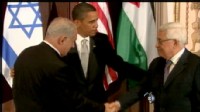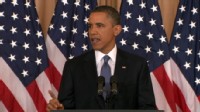Speaking to reporters after their more than an hour and a half long meeting, Obama sought to diffuse the tensions, saying that differences will "happen between friends."
Charles Dharapak/AP Photo
President Obama meets with Prime Minister... View Full Size
President Obama Speaks to the Middle East Watch Video
President Obama Remarks on Israel Watch Video
Obama Reopens Door to Israel, Palestine Peace Deal Watch Video
"There are some differences between us in the precise formulations and language, and that's going to happen between friends," the president said. "But what we are in complete accord about is that a true peace can only occur if the ultimate resolution allows Israel to defend itself against threats and that Israel's secuirity will remain paramount in U.S. evaluations of any prospective peace deal."
More telling, however, was Netanyahu's response. Talking directly to Obama, Netanyahu asserted that any border based on lines that existed before the 1967 Six Day War would be "indefensible" and a threat to Israel's security.
"They don't take into account certain changes that have taken place on the ground; demographic changes that have taken place over the last 44 years. Remember that before 1967, Israel was all of 9 miles wide -- half the width of the Washington Beltway," Netanyahu said. "Israel has certain security requirements that will have to come into place in any deal that we make."
Netanyahu also refused to work with any Palestinian government that would include Hamas in the negotiations, calling the group the "Palestinian version of al Qaeda."
Obama's remarks, part of his broad-ranging speech on the Middle East and the so-called Arab Spring, caused a stir across the Arab world.
Two of Israel's main newspapers carried the headline "confrontation," as editorial writers blasted the Obama administration for the "ambush."
Officials say Netanyahu's issue with Obama's invoking the pre-1967 lines as a starting point for negotiations is less the notion itself than a belief that it would essentially reward Palestinians at the bargaining table without their having to concede anything in return.
Although there's unilateral consensus among experts that the relationship between the United States and Israel is at its nadir, the tension between the two leaders has been building for years amid disagreements on the issue of settlements and the peace process.
Thursday was the first time a U.S. president has laid out his vision on the borders so starkly in a high-profile speech. Administration officials said they hoped the message would appease Palestinians and stop them from pursuing unilateral recognition at the United Nations, something the president warned against Thursday. In a nod to the Israelis, the president also avoided the issue of settlements and division of Jerusalem, another two main points of contention.
But critics say Obama made lofty pronouncements that have cornered not just Israelis but Palestinians as well. In the absence of a peace dialogue, some observers say, Obama has declared policy positions that are unlikely to have much of an effect.
"The relationship was already frayed between the two men and between the U.S. and Israel, and this will deepen the already existing tension," said Michael Singh, managing director of The Washington Institute and a former senior director for Middle East affairs at the National Security Council. "It's telling that he [Obama] didn't actually call for any particular action -- a quartet meeting or a summit. To do this the day before he meets with the Israeli prime minister, it's bad diplomacy and bad timing."
On the other hand, Obama's speech hasn't tempered Palestinian sentiments either. A spokesman for President Mahmoud Abbas said they appreciated Obama's efforts to revive the peace process, but expressed some disappointment with the lack of pointed language on the settlements.
The speech will do little to remove the distrust between Obama and the Palestinians, an issue that was highlighted in Abbas' recent interview with Newsweek.
"It was Obama who suggested a full settlement freeze," Abbas said in the April interview. "I said OK, I accept. We both went up the tree. After that, he came down with a ladder and he removed the ladder and said to me, 'Jump.' Three times he did it."
Without solid peace talks in progress and a lack of trust on all fronts, the president's words will do little to advance negotiations, experts say.
"What's really needed is that the U.S. have trust with both parties," Singh said. "Without that trust, the U.S. simply becomes kind of a cheerleader; no different than other countries who make pronouncements."
Egypt Receptive to U.S. Debt Relief
More widely in the Arab world, the reaction to the speech was also less positive than some in the administration might have hoped.In North Africa and the Middle East, the general reaction has been "more of the same, no substance." Despite Israeli outrage, the 1967 proposal is being taken in the region as continued support for Israel because there was no mention of refugees, Jerusalem and settlements.
Some critics say they believe Obama is dangerously meddling into affairs that are not within his reach. "Tell Obama to leave us alone," a young Egyptian told ABC News.
On the other hand, Obama's economic outreach has been well received, especially in Egypt. The United States will provide a debt relief of $1 billion to Egypt -- one of the United States' oldest and closest partners in the Arab world -- and guarantee another $1 billion in loans to finance infrastructure and job creation.
In Egypt, Thursday's headlines bore not a word about Obama, but today's newspapers highlighted the $2 billion for Egypt above the fold. While there are some who say "we don't need your money," by and large it has been well-received and is appreciated.
But the gesture has fallen short of reversing public opinion.
ABC News' Jake Tapper contributed to this report.
More from ABC News






No comments:
Post a Comment